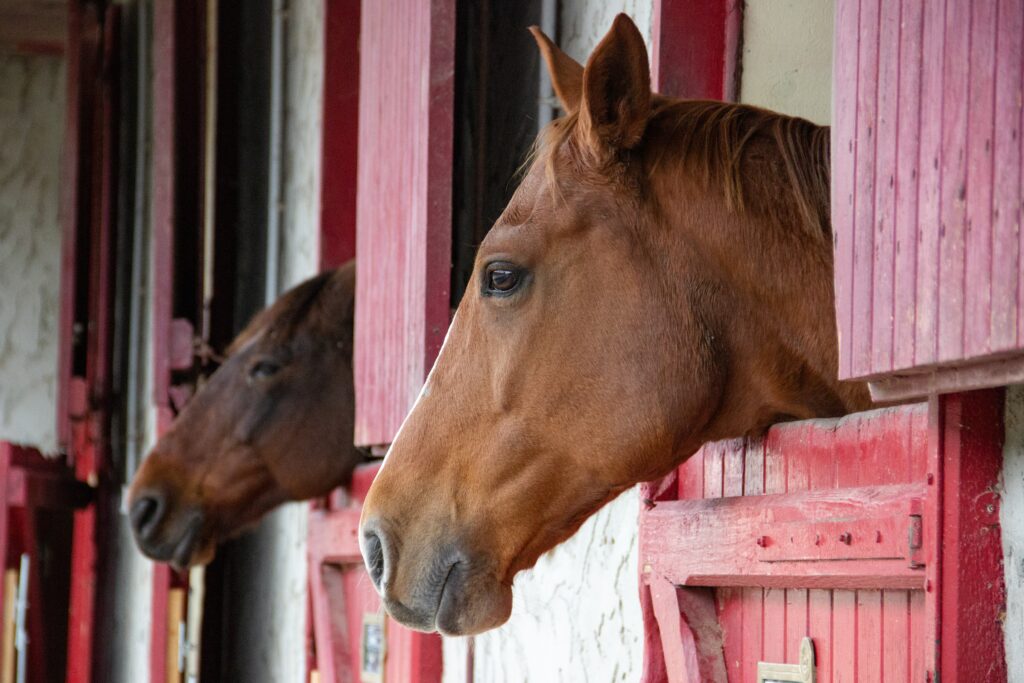Flies are a barn owner’s biggest nuisance, especially in warm weather. Not only are flies annoying and can bite or sting your horses, they also can spread a number of diseases. Here, the horse lovers at Springtime Supplements offer some tips to control the flies and keep your herd happy and comfortable.

Prevention is the Best Treatment
The easiest way to manage flies is to not have them. This may be easier said than done, though. Keeping up with the following habits can help you to create a no-fly zone in your barn:
Control Moisture
Flies need wet areas to breed and lay their eggs. Make sure to keep stalls dry and clean. They should be mucked thoroughly at least once a day, and twice if your horse is spending a majority of the day inside. In addition, you should take the time every few months to strip your horse’s stall. Stripping includes removing all shavings and cleaning the rubber mats underneath. The mats create a dark, moist environment, which is perfect for fly larvae and other bacteria to breed.
Be sure to examine your pastures as well to eliminate any standing water. Standing water is the perfect breeding ground for flies and mosquitos. Regularly clean out feeders and water troughs or any other receptacle that may collect water. Make sure that this practice extends to the rest of your barn as well. Ensure that leaks are repaired in a timely fashion and create good drainage where needed.
Manage & Remove Manure
Manure is a fly’s meal of choice, so removing its main food source will greatly decrease the chance a fly will stick around your barn. Make sure that you are mucking stalls or round pens at least once a day. If possible, have manure piles removed from your property at least once a week, especially during the summer. It is also important that you keep manure dry, usually by covering it with a tarp. Wet manure piles will allow flies to feast and breed rapidly.
Install Fans
Moving air makes it difficult for flies to land. Installing box fans on your horses’ stall doors will not only keep them comfortable and cool during the summer months but will also provide relief from pesky flies. Large fans can be placed at the end of barn isles to keep air circulating. However, be sure that all plugs and cords are tucked away where they can’t be chewed on.
Keep Food Hidden
To limit what flies can eat in your barn, make sure that all potential food sources are covered. Keep lids on trash cans and make sure that all grains and feeds are in air-tight containers. If you have other furry barn helpers such as dogs or cats, don’t keep their food out in the open.
Turn Off the Lights
Lights can attract flies and other insects. Be sure that you turn off isle, tack room and feed room lights when they’re not in use to keep bugs at bay.
Managing Flies in Your Barn
Unfortunately, it’s nearly impossible to prevent any flies from entering your barn. Here are tips to help cut down on the number of flies who have already found their way into your barn:
Fly Barriers
Using physical barriers such as fly sheets, fly masks, fly boots and fly screens can help to keep flies away from your horses. Fly sheets are lightweight mesh sheets that protect your horse’s body from flies. They are cool enough that most horses are comfortable wearing them during the day, even during the summer. Fly masks cover your horse’s face and can even extend protection to your horse’s nose and ears. Made of the same lightweight mesh that fly sheets are made out of, fly masks protect your horse’s eyes from pesky bugs. Fly boots act similarly to fly sheets and fly masks, but provide fly protection from your horse’s coronet band to their knee. These different forms of fly protection come in a variety of sizes and styles to offer protection to horses and ponies of all sizes.
Installing fly screens, or large hanging pieces of mesh, in the entryways or windows of your barn can provide another barrier to flies trying to get to your horses. By preventing flies from snacking on your herd, you’ll cut down on the number of bugs in your barn.
Flytraps
Flytraps provide active management of flies that currently live in your barn. There are a variety of types of different fly traps, including sticky tape and attractant traps, so it is important to thoroughly research which trap will be best for your barn.
Fly Parasites
Sometimes the best way to fight bugs is, well, more bugs. Fly parasites are tiny low-flying wasps that are harmless to humans and animals that feed on flies when they are in the immature pupal stage, preventing them from ever hatching. Introducing these bugs to your barn’s ecosystem offers a natural way to cut down on the number of new flies hatching.
Supplements
Believe it or not, simply adding supplements can help to cut down on the fly population in your barn. Springtime Supplements’ Bug Off Garlic offers a 24-hour shield against biting insects including flies, when given daily.
The Team at Springtime Supplements Can Help You Manage Flies in Your Barn
While there’s no quick fix to eradicate flies in your barn, taking the above measures can greatly reduce the number of pesky bugs that try to feed on your herd. At Springtime Supplements, we offer a line of natural supplements that provides protection from flies and other bugs. Call us at 1-800-521-3212 to talk with a member of our customer service team. At Springtime, we believe animal lovers gotta stick together, and we’d love to help you pick the right supplements for tackling flies in your barn.
